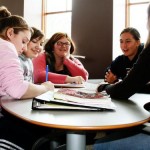 Our opinions seldom exist, nor are formed, in isolation. Instead, we are influenced heavily by the opinions of those around us. A recent study set out to quantify just how big this influence was for participants in both France and Japan. The study has enabled the researchers to develop a theoretical model of group interactions that can be used to predict team performance depending on the amount of information exchanged. They eventually hope to develop automated decision support tools.
Our opinions seldom exist, nor are formed, in isolation. Instead, we are influenced heavily by the opinions of those around us. A recent study set out to quantify just how big this influence was for participants in both France and Japan. The study has enabled the researchers to develop a theoretical model of group interactions that can be used to predict team performance depending on the amount of information exchanged. They eventually hope to develop automated decision support tools.
Virtual collaboration
The researchers were inspired to undertake their work due to the huge increase in digital tools to support team work, whilst social networks have also facilitated information sharing in all aspects of life. Even e-commerce sites facilitate considerable sharing of information via user reviews. When deliberately false information is thrown into the mix, it makes processing that information correctly very hard.
So the researchers wanted to develop tools to help us to make better collective decisions. To do this, they focused on the way other people influence the decisions we make, and in what circumstances can this influence be positive (and negative).
Participants were tasked with answering a number of questions, from Gandhi’s age when he died to the number of stars in the galaxy, with each answer rated for the confidence people had in it. After initial guesses, social information in the form of the average responses of their peers, was given to each person, and they were allowed to modify their answer.
Also present were virtual agents who were under the control of the research team (unbeknownst to the participants). This virtual agent always gave the exact right answer, but the number of them varied so that for some participants they had a bigger influence than others.
Social influence
The results reveal how strong social information can be in guiding our decisions. The team also believe their findings give them insight into how sensitive certain subjects are to social influence. The team produced five sensitivity profiles that were consistent across both French and Japanese cultures.
For instance, just 29% of people maintained their original guess, with 59% compromising based upon the new information given to them. This movement was especially strong when the social information given to the participant was counter to their original guess. Interestingly, the results showed that the performance of the group was sometimes enhanced by the presence of a small quantity of incorrect information, as this was shown to overcome cognitive bias that leads to underestimates being made.
The results allowed a model to be developed to replicate the impact social information had on decision making and enabled predictions to be made on the size of the influence on a group.
“A better understanding of the governing processes of how social information influences individual choices and collective information opens new perspectives. Personalized algorithms could be developed to anticipate the different types of answers according to the form of social information received. This could contribute to improving cooperation and collaboration on the scale of groups,” the team conclude.